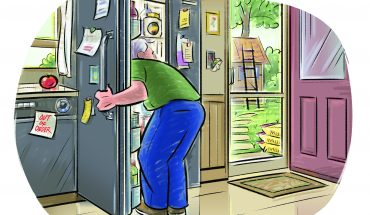
Sunnybrook is one of several apartment buildings run by CASA, a nonprofit in Raleigh, that provides affordable housing.
by Hampton Williams Hofer
photography by Juli Leonard
One Raleigh woman and her daughter used to spend every afternoon waiting in line for a bed at the shelter. Now, the daughter spends her afternoons at Girl Scouts meetings. A Raleigh man used to sleep in a tent by the highway, hoping it wouldn’t rain. Now, when he sees storm clouds, he doesn’t worry that he’ll lose all of his belongings. These stories, and those of thousands in this community, have ended in hope, thanks to CASA, a Raleigh-based nonprofit that develops and manages affordable apartments in the Triangle for low-income individuals and families, many of whom are veterans or living with disabilities. For 26 years, CASA has worked with the goal that no tenant becomes homeless again. At CASA, the complex problem of homelessness is met with a seemingly simple solution: housing. “When people look at the cost of apartments to rent in our community, it’s overwhelming, and it’s easy to think there’s nothing you can do about homelessness, but there is something you can do,” says Missy Hatley, CASA’s resource development director, “And we’re doing it.”
In 1993, the organization purchased its first four properties in downtown Raleigh with a grant from the U.S. Department of Housing and Urban Development. CASA now manages 490 properties in Wake, Durham, and Orange counties. “At first, people think, oh, these affordable apartments will devalue my neighborhood, but then they find the opposite to be true,” says CEO Mary Jean Seyda. CASA often rehabs abandoned buildings or builds new structures that add to the value and vibrancy of their settings. In Raleigh, these buildings are nearly all inside the beltline, for easy access to public transportation. “It can happen to anyone,” says one tenant, a veteran whose combat injury caused a neurological condition that prevents him from holding a steady job. “I didn’t think it could happen to me. I’m educated, I went to a good school, I have a degree and had a good job, but when I got sick, I lost my savings and it was all—just gone.”
For individuals who have experienced homelessness, an apartment means dignity. In CASA apartments, tenants pay 30 percent of their income on rent, regardless of the number on their paychecks. For those who have experienced homelessness, moving off the streets and into a home outwardly changes them: “Tenants start to look different,” Hatley says, “They come in seeming taller, holding themselves differently, looking you in the eye.” During bouts of homelessness, many tenants kept people at arm’s length so no one would know, but once the tenants receive housing, they can reunite with family, have their children visit, and reconnect with friends. Many join churches, volunteer in the community, and realize their potential as contributing members of society.
An apartment also means safety. Many CASA tenants cry when they first hold their apartment keys, when they realize they have a door to lock, a place of refuge. “I can go home and be at peace, and I’m able to cook,” one tenant says, “If I want to get up at four o’clock in the morning and fry eggs and bacon I can do that. My self-esteem is a lot higher. My health is better.” Having a refrigerator means access to more nutritious foods, but the health factor goes beyond the kitchen. One local couple slept on the street for years before learning the wife had cancer. Her doctor would not allow her to start chemotherapy while living in a tent. Desperate for housing that could save her life, she turned to CASA. The couple now lives in an apartment near Cameron Village, which will be their home indefinitely.
Dr. Keith Hull, co-founder of Raleigh Neurology Associates, says: “Since my earliest career, many patients who were homeless have told me that it was hard to keep their medications secure, and to remember to take them, because of uncertainty about where they were going to sleep.” Hoping to provide a good example of community service for his children, Hull joined the volunteer Wake County Board of Mental Health in 1989, where one of his ideas led to the formation of CASA. After 26 years of involvement with the nonprofit, Hull says, “Working with CASA has been like achieving success during a Monopoly game; it’s easier to sustain the effort when, as time goes by, we’re seeing more CASA structures in more neighborhoods.” One such CASA structure is a veterans’ community near WakeMed called Hull’s Landing, which was named for Dr. Hull. He believes CASA has perfected a system that “efficiently and wisely uses resources from local donors, banks, and governmental agencies to develop clean, safe, and affordable housing for our tenants.”
CASA doesn’t just provide the affordable housing; it also has a compassionate property management team, a leasing staff, and a maintenance staff that frequents the sites to ensure things are in working order. “We’re always saying please call us,” Seyda says, “Those properties are our assets, and we want to be good stewards both to our tenants and our funders and donors, by sustaining these buildings into the years ahead. It can take a while for new CASA tenants to believe they can ask us for help.” Some tenants worry they’ll be charged for things like leaky faucets and broken appliances; others just aren’t comfortable asking for help. Of the second sort, most are veterans who are hesitant to ask for help since they are used to being the helpers themselves. Typical landlord turn-offs like bad credit and criminal records won’t keep tenants out of affordable housing: “CASA serves people who are left out,” Hatley says. “We say yes.”

CASA’s new CEO Mary Jean Seyda
Within CASA’s properties, there is a tremendous sense of community. One new tenant is a young woman who aged out of the foster system at age 18 and experienced years of homelessness. “This is her first apartment in her own name,” Hatley says, “and her favorite thing about it is that she has nosy neighbors.” The tenants check on each other and care for one another. The apartments are dignity, safety, and health, but they are also community.
CASA will host its 5th annual Cabin for CASA September 20 at Whitaker & Atlantic. It’s a party with an auction and raffle, and a $100,000 goal. This year’s fundraiser is particularly significant, as it is the first one since the loss of CASA’s CEO of 23 years, Debra King, who lost her battle with blood cancer in April. Under King, the organization grew to a 27-person staff with an operating budget of $4 million, but Seyda says that King’s main legacy is one of compassion: “When it came to homeless children in our community, Debra would say, ‘We’re better than this. We have to be better than this.’” CASA plans to honor King at this year’s Cabin for CASA, and also to raise funds for land in Wake County where a community will be built in her name.
Last year, 98 percent of CASA tenants completed a year of paying monthly rent. Nearly 500 tenants and their families currently live in CASA apartments around the Triangle, but another 1500 are waiting in the applicant pool—waiting while they line up for shelter beds and pitch their roadside tents, waiting as CASA works tirelessly on new developments, more land, more apartments, until every one of them has a roof and a bed. “We have worked with other groups in other communities that work on part of the problem, such as helping pay bills and providing services, but this doesn’t get to the fundamental issue of affordable housing,” says board member Stewart Witzeman, who along with his wife, Kerry, has been involved with CASA since they moved to Raleigh five and a half years ago. “CASA’s model gets to the root of the problem, treats people with dignity, and helps those that can be easily forgotten,” he says.
Recipients of CASA apartments who used to sleep in their cars, or on inflatable mattresses in storage units, find real human compassion at CASA, and the solution isn’t temporary: As long as the tenants pay rent, their leases will never expire. “When you don’t feel safe, you’re always looking over your shoulder,” one tenant says, “Thanks to my apartment, I don’t have to do that anymore. Now I look ahead.”



